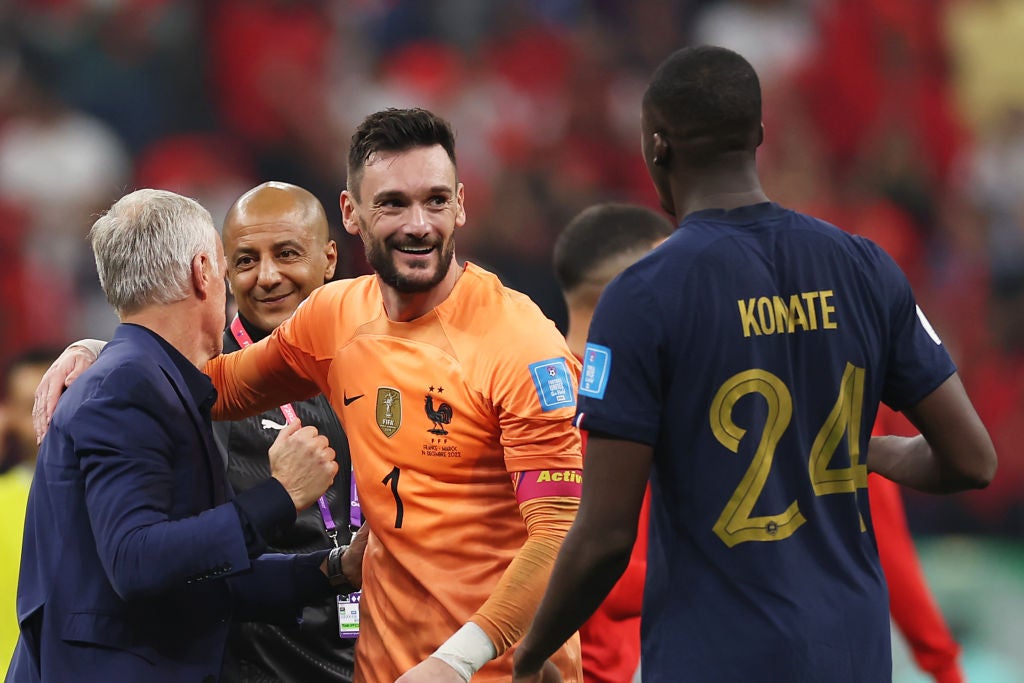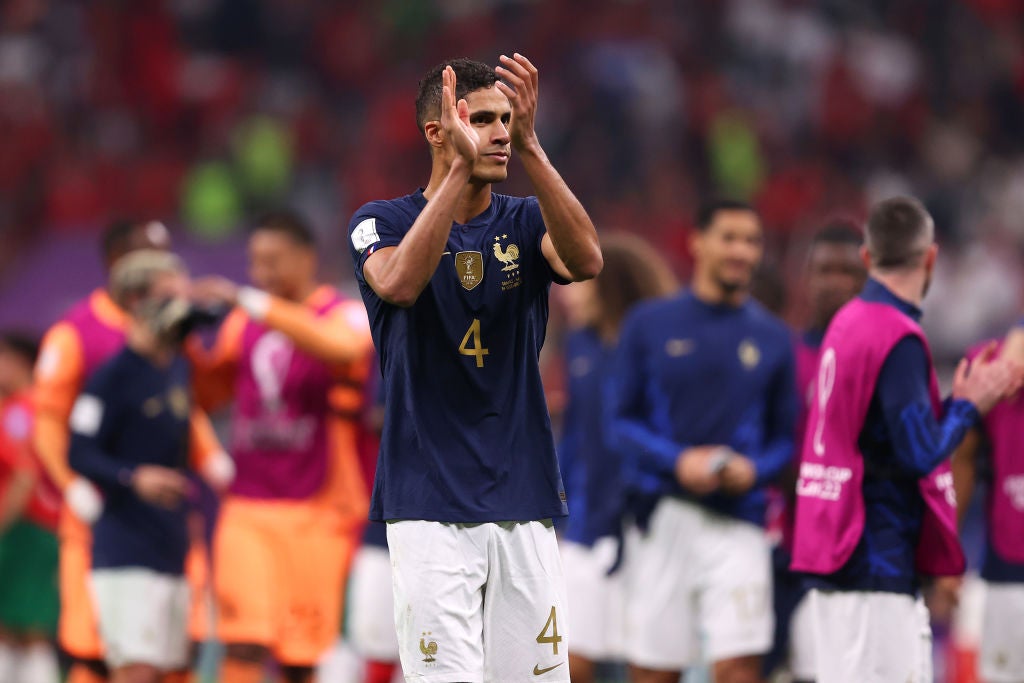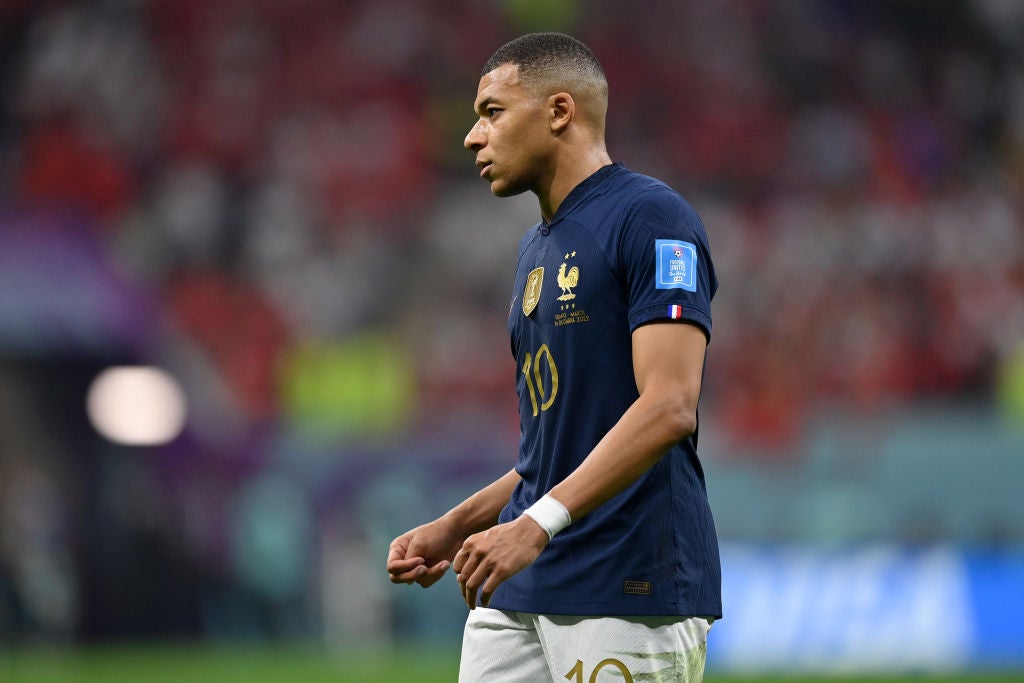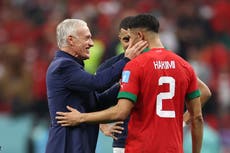Didier Deschamps’ most masterful work has been uniting a divided football nation
France and their serial winner of a manager stand on the verge of World Cup history

Liberte, Egalite, Dynastie? A particularly prominent Parisian believes so. “Over the past 20 years you can say France is the top footballing country in the world,” Walid Regragui said. “They have the best players and the best coaches and they are the best team in the world.”
As France approach their fourth final in the last seven World Cups, aiming to become the first team to retain the title since Brazil in 1962, perhaps football is coming home. The World Cup, after all, was created by a Frenchman, Jules Rimet. As Didier Deschamps bids to join Pele in the select band of the three-time winners, a second Frenchman has come to assume a similar importance in the competition. France’s success owes much to one man, captain in 1998, manager in 2018 and 2022, on the brink of history again.
It also owes something to immigration and emigration. In the global game, France are the global team. While Paris arguably produces more elite players than any other city in the world - and one of them, Kylian Mbappe, could be anointed as the finest footballer of all - French football is notable for its dual nationals, to borrow a phrase from Regragui, the son of the Paris suburbs who became a transformational Morocco manager.
Deschamps’ players were also qualified to represent Cameroon, Algeria, Portugal, Spain, Martinique, Benin, Mali, Mauritania, Guinea-Bissau, Italy, Guadeloupe, the Democratic Republic of Congo, Lebanon and Morocco.
Just as in 1998, when the ‘Black-Blanc-Beur’ team with African and Arab heritage prevailed, the France team is benefiting from the best of many worlds. Just as then, they offer one vision of France and the far-right nationalists of the Front National and the Le Pen family another. “Faces from immigration are undeniably over-represented in this team. So I am not sure that it is representative of the balance between French people of French origin and French people of immigrant origin,” said Marion Marechal Le Pen this week. Such complaints were probably not aired when the Marrakech-born Just Fontaine top-scored in the 1958 World Cup or Michel Platini, of Italian descent, captained France to victory in Euro 1984, but Les Bleus are not white enough for some.
Much as it irritates certain nationalists, France reflect a more modern and cosmopolitan footballing world. The traffic in footballers runs two ways: the graduates of the Clairefontaine academy, which was much envied and copied after the 1998 World Cup, include both Mbappe and the Portugal left-back Raphael Guerreiro.
But there is a sense that France are also aided by the relative weakness of Ligue 1. Talent is imported, but also exported. Deschamps’ 25-man squad are divided among the five main European leagues: six in the Bundesliga, six in Ligue 1, five in the Premier League, five in LaLiga and three in Serie A. Some 109 French players have appeared in the English, German, Italian or Spanish top flights this season. It can aid them further.
Paris, in particular, produces players, but some are polished up elsewhere. Kingsley Coman left France as a teenager. So did Ibrahima Konate and Dayot Upamecano, who are both in part success stories of the Red Bull empire. The Hernandez brothers came through Atletico Madrid’s youth system; Antoine Griezmann was picked up by Real Sociedad at 14. The potential player of the tournament for France has never played for a French club.
The poster boy of the team, Mbappe, received a call from president Emmanuel Macron urging him not to leave France in the summer, though that may not have been the decisive factor in keeping him at Paris Saint-Germain.
Given PSG’s repeated failures on the continental stage, it may cost him the most prestigious club medal. And yet a French influence is very apparent. A Frenchman, Henri Delauney, proposed creating the European Championships; another, Gabriel Hanot, was the driving force for the start of the European Cup. No French club has won the Champions League since Marseille, captained by Deschamps, in 1993, but 35 French players have, including Deschamps in his subsequent spell at Juventus. Since 2004, only Inter Milan, in 2010, and Liverpool, three years ago, have won the Champions League without a French player. Their talent is such that others deem them essential.
All of which can illustrate why French football is ubiquitous rather than unique. The French may be a sign of the homogenisation of football; they have just combined attributes and influences better than anyone else. The last European dynasty, the Spain side who won the 2010 World Cup and the 2008 and 2012 European Championships, had a distinct style of play, based on perpetual possession. Not France: their 52.2 percent share puts them 14th, sandwiched by the United States and Canada, miles behind Spain whose philosophy proved self-defeating: for the second successive World Cup, they exited on penalties after a match when they had 1,000 passes.
Go back four years and France had a minority share of the ball, 48.3 percent. And if that is explained in part by facing better sides in the knockout stages and in part by an Mbappe-influenced ability to spring devastating counter-attacks. France’s legacy will lie in winning. They have not evolved the game, nor tried to. They bear a closer comparison with past German sides who were defined by mental strength and an ability to grind out results than any distinct style. The new Turniermannschaft are Les Bleus.
Since 2016, they are in a third major final out of four, with their lone early exit coming on penalties in Euro 2020. Deschamps represents a curious figure: put him in the club game and he might not be perceived as world class, but beat Argentina and he has a case to be deemed the greatest international manager of all time. The spectre of Zinedine Zidane, the great French folk hero, has loomed over him but certainly he has a fan in Regragui, surely the manager of this tournament. “Didier Deschamps showed in the last 10 years he was the best coach in the world,” he said.

Only Vittorio Pozzo has won two World Cups. Perhaps, if anyone were to equal him, Deschamps had the schooling. He played for three World Cup-winning managers, in Aime Jacquet for France, Franz Beckenbauer at Marseille and Marcello Lippi at Juventus, albeit before he led Italy to the 2006 title.
When Belgium, ranked No 1 in the world for much of the period between the 2018 and 2022 World Cups, posted an advertisement looking for a “serial winner” to succeed Roberto Martinez, the thought occurred that France have the role model.
But backing up success has become increasingly difficult. Winners have tended to suffer hubristic falls. “We keep talking about the curse of the champions,” Deschamps said, and it had not escaped attention in France that the previous three World Cup winners, in Italy, Spain and Germany, then all exited in the group stages. France took the maximum six points from their first two matches to break that particular run and Deschamps reflected: “Statistics are there to be contradicted.”
Part of his job has been to save French football from itself. Their outstanding record in the last seven World Cups could have been still better but for two group-stage failures. In-fighting cost them in 2010 and the fallout from France’s Euro 2020 campaign suggested that Les Bleus had lost their fraternite.
Adrien Rabiot’s often controversial mother Veronique confronted the families of Paul Pogba and Mbappe in the stands. Rabiot himself has subsequently downplayed that. Bonds may have been repaired now. “In everything they do, both on and off the pitch, they are united,” Deschamps said. “We have a great relationship between players and coach,” said captain Hugo Lloris, and Deschamps’ skill as a man-manager and deft personal touch have been recurring themes. “You need to like the footballing ability but also to get to know them as a person and know as they think,” the 54-year-old said.
The other warning from the past came from 2002, their first tournament after his international retirement as a player. With Roger Lemerre displaying too much loyalty to his World Cup winners, France were too old. Injuries, particularly to Zidane and Robert Pires, took too great a toll. Fast forward two decades and Deschamps picked the 10th-youngest squad but the injury list was longer: the Ballon d’Or winner Karim Benzema, the rising star Christopher Nkunku, the 2018 final scorer Pogba, the essential N’Golo Kante, the first-choice centre-back Presnel Kimpembe and, within a few minutes of the tournament starting, the regular left-back Lucas Hernandez. In addition, Raphael Varane began the World Cup on the bench after a month out.

Deschamps has had an uncomplaining approach. Injuries have not been excuses. It helps that the alternatives are of such a calibre. “I have a great pool of players,” he said. “The ones with me are not as experienced as the ones I would have called up, most of them don’t have 50 caps for the national team but they play for the best European clubs.” His reconfigured team includes players at Bayern Munich and Barcelona, Real Madrid and Manchester United, Atletico Madrid and AC Milan. These are rare luxuries.
But a clarity of thought has also underpinned France’s challenge. Deschamps had won the Nations League with a back three but was swift to decide on a back four for the tournament. When Benzema was ruled out, he was able to recall Olivier Giroud, who had claimed the Real Madrid forward caused a “tactical imbalance” on his return to the national team, and switch formation to use Mbappe and Ousmane Dembele in much wider roles.
Deschamps’ masterstroke has been to reinvent Griezmann as a midfielder to help compensate for the lack of Pogba. It was a decision taken in consultation with his players, made knowing the character of a man with 42 international goals. “The sacrifice is for one reason, he is so generous,” he said. Griezmann has embraced his defensive duties to such an extent that only 11 players boast more combined tackles and interceptions this World Cup than him. Meanwhile, he has created most chances, tops the table for expected assists and is joint top for actual assists.
Griezmann is an emblematic figure who reflects well on Deschamps but he is not alone. Lloris, Giroud and Pogba all belong in a group who have reached a higher level for country than club. For two, there have been historic achievements this World Cup. Lloris has beaten Lilian Thuram’s record of 142 caps for France and Giroud has overtaken Thierry Henry’s best of 51 goals. First capped at 25, Giroud has been an unfashionable figure at times, but Deschamps’ judgment has been richly vindicated.
There are other examples of sharp decision making. Rabiot refused to be on standby for the last World Cup. His France career could have been over. He was surprised how willing Deschamps was to bring him back into the fold. “He wasn’t with us for some time for a number of different reasons,” the manager said diplomatically. “He is a player that brings balance to the team.” Rabiot started the tournament with France’s first goal, averting embarrassment after Australia took the lead. He has also offered defensive ballast, supporting the attack-minded left-back Theo Hernandez. He was missed when illness ruled him out of the semi-final.
It is a team where everyone has a tale. Deschamps can seem a conservative figure, though his reluctance to blood all of France’s emerging talents is partly explained by the competition for places. With Varane a constant at the heart of his defence, he initially seemed unconvinced by Upamecano but now feels the Bayern Munich centre-back has more mental strength. He believes Dembele is more mature and complete than he was. In Aurelien Tchouameni, he has found a replacement for Kante and, judging by his tribute to the Chelsea midfielder when he was ruled out – “not having N’Golo lessens our strength in terms of everything he represents… he is an adorable little man,” – his absence felt the biggest blow.

Deschamps had to construct a whole new midfield but maybe only France are blessed with such ability that it is possible. It helped that he possesses perhaps the most devastating forward around.
“Kylian is Kylian and he has that capacity to make a difference,” he said. He has compared Mbappe to a steam train and the Mbappe Express has felt unstoppable.
But it has helped that a player who objected to being used as a focal point in attack by PSG has had Giroud to act as the No 9 for France. But if part of Deschamps’ gameplan is simply to defend well and rely on Mbappe to spring moments of magic, there is a pragmatic logic to it.
And the Deschampsian way has progress in part by weight and depth of talent. It puts France on the brink of doing something no one has for 60 years, since a World Cup without African and Asian teams, and no manager for 84, since the three non-European sides included Cuba and Dutch East Indies but not Argentina. “There is going to be a final step,” said Deschamps after the semi-final win over Morocco.
It would be a step into history. And for France, whose ruling dynasties included the Capetians, Valois and Bourbons, it would add another: Deschamps and the footballers.
Join our commenting forum
Join thought-provoking conversations, follow other Independent readers and see their replies
Comments


Bookmark popover
Removed from bookmarks